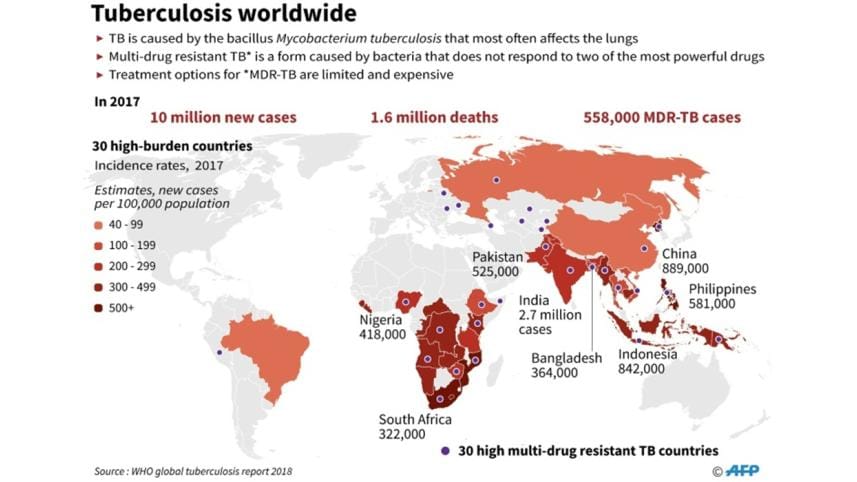Millions with high blood sugar face TB risk

Millions of people with high blood sugar may be at greater risk of tuberculosis than previously thought, scientists said Friday, warning that diabetes and TB could combine to create the "perfect storm" of disease.
Tuberculosis, a severe infection caused by bacteria in the lungs, kills almost as many people each year as HIV/AIDS and malaria combined.
In 2017 nearly 10 million people developed TB, according to the World Health Organization, and experts are concerned that a global explosion in diabetes will put millions more at risk.
New research unveiled this week at a global lung health conference in The Hague also suggests further cause for worry.
For the study, scientists at the London School of Hygiene and Tropical Medicine conducted blood tests on people living with tuberculosis and diabetes in four countries: South Africa, Romania, Indonesia and Peru.
They then tested people with TB and blood sugar levels that were high, but below the threshold for diabetes.
They found that blood samples from those who did not have diabetes still contained molecules associated with people suffering from TB/diabetes.
"This tells us even before a person develops diabetes, the risk of developing TB is higher," Ajay Kumar, a research director at The International Union Against Tuberculosis and Lung Disease, who was not involved in the study, told AFP Friday.
In some countries such as India, home to roughly a quarter of all tuberculosis cases, anyone found to be carrying TB must automatically be screened for diabetes, and vice versa.
Kumar said the study showed that countries should also check patients with high blood sugar for tuberculosis.
He said "millions" of people with elevated blood sugar could be at additional risk.
'Perfect storm'
The link between diabetes and tuberculosis is known, though poorly understood. Diabetes slows the body's natural defences, allowing TB the chance to develop.
While TB infections and deaths have declined slightly in the last decade, type II diabetes has exploded.
It is a potent risk: roughly one in four people on Earth carry the TB bacteria in their bodies, and the WHO says more than 450 million people worldwide are type II diabetic.
Paul Jensen, director of policy and strategy at The Union, said the countries of greatest concern were those with a high latent TB rate and a growing diabetes problem: India, China, Pakistan and several southeast Asian countries.
"We describe this issue in terms of a perfect storm -- economically developing, already a huge pool of latent TB infection and here you have this issue with diabetes escalating," he told AFP.
Although TB is curable, the treatment regimen has historically been long, painful and come with significant side effects.
"If you have TB and diabetes at the same time, it makes treatment even more complicated," Jensen said. "You're more likely to get TB again in the future and you're more likely to die."
The global fight against tuberculosis has frequently focused on HIV/AIDS prevention, as that disease, like diabetes, increases TB risk.
Both Jensen and Kumar said more needed to be done to protect people from TB caused by diabetes.
"We saw what happened with TB and HIV in sub-Saharan Africa where HIV weakens the immune system and TB skyrocketed," Jensen said.
"Already about eight percent of the global TB burden is attributable to diabetes but we don't see nearly as much attention paid to TB diabetes as HIV diabetes."



 For all latest news, follow The Daily Star's Google News channel.
For all latest news, follow The Daily Star's Google News channel.
Comments